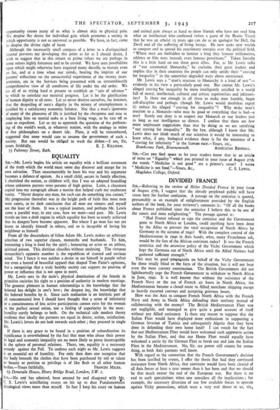Sta,—No one has admired, been amazed by and disagreed with
C. S. Lewis's scintillating essays on his up to date Fundamen theological views more than myself. In fact I keep his essay -on human
and animal pain always at hand to show friends who have not read him what an intellectual who confessed (when a guest of the Brains Trust) that he was an atheist 15 years ago can do as an apologist for Hell, the Devil and all the suffering of living beings. He now seeks new worlds to conquer and to spread his reactionary energies over the political field. " Where men are forbidden to honour a king they honour millionaires, athletes or film stars instead; even famous prostitutes." Taken literally this is a little hard on our three great allies. For, as Mr. Lewis talks of " our ceremonial Monarchy," he excludes their great leaders and implies that in their countries the people can only satisfy their " craving for inequality " in the somewhat degraded ways above mentioned.
Mr. Lewis says a " man's reaction to Monarchy is a kind of test "- evidently in his view a particularly good one. But cannot Mr. Lewis's alleged craving for inequality be more intelligently satisfied in a world full of moral, intellectual, cultural and artistic superiorities and inferiori- ties? Is there not enough in all these to make men humble, beget self-discipline and perhaps (though Mr. Lewis would doubtless regret it) reduce his alleged " craving for inequality "? Why make man's reaction to a Monarch—who may be good or everything that is bad—a test? Surely our duty is to respect our Monarch or our leaders just as long as- our intelligence so directs. I "confess that there are few more unpleasant suggestions than that by doing so we are satisfying "our craving for inequality." By the bye, although I know that Mr. Lewis does not think much of our scientists it would be interesting to learn what, if any, biological evidence there is for the existence of a "craving for inferiority " in the human race.—Yours, etc.,


























 Previous page
Previous page